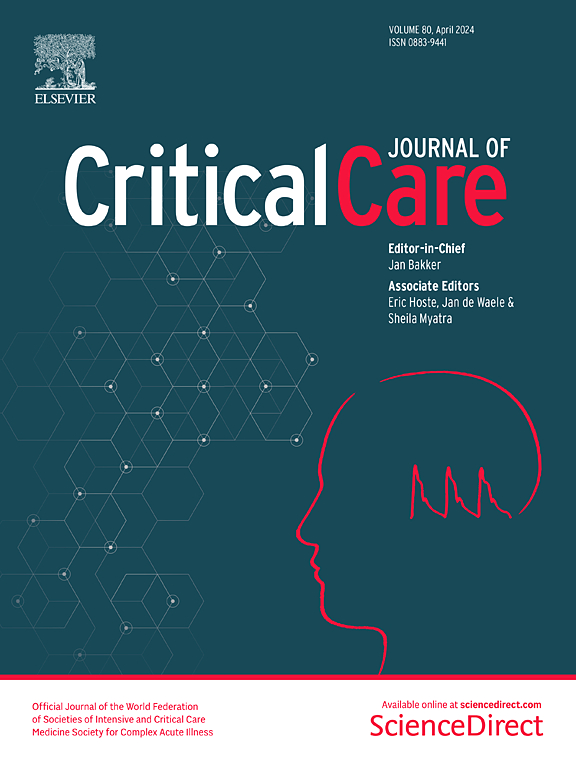Tumour necrosis factor-alpha inhibitors decrease mortality in COVID-19: a systematic review and meta-analysis
IF 8.8
1区 医学
Q1 CRITICAL CARE MEDICINE
引用次数: 0
Abstract
Despite widespread vaccination efforts, effective treatment strategies remain critical for severe SARS-CoV-2 infection. Tumour necrosis factor-alpha (TNF-α) plays a central role in the cytokine storm characteristic of severe COVID-19. This systematic review and meta-analysis evaluates the effectiveness, efficacy, and safety of TNF-α inhibitors in the management of COVID-19. A systematic review of PubMed, Embase, and CENTRAL was conducted, focusing on studies involving SARS-CoV-2-infected patients treated with TNF-α inhibitors compared with those receiving standard of care without prior TNF-α inhibitor use. Data from studies published up to August 12, 2024, were analysed. Outcomes assessed included mortality, invasive mechanical ventilation, and C-reactive protein (CRP) levels. Odds ratios (ORs) and mean differences (MD) were calculated with 95% confidence intervals (CI), and subgroup analyses were performed for randomised controlled trials (RCTs) and non-randomised studies. Seven studies involving 1393 patients with moderate-to-critical COVID-19 were included. TNF-α inhibitor treatment was associated with a reduced odds of mortality (OR 0.67, 95% CI [0.44–1.00], P = 0.052), which was statistically significant in the RCT subgroup across three studies (OR 0.75, 95% CI [0.58–0.97], P = 0.042, certainty of evidence: very low). The number needed to treat for mortality was calculated to be 16 (95% CI 9.0-inf.), which indicates that one additional death could be avoided for every 16 patients treated with TNF-α inhibitors compared to standard of care. No significant reduction in the need for invasive mechanical ventilation was observed (OR 0.95 [95% CI 0.46–1.94]; P = 0.822). Additionally, TNF-α inhibitors resulted in a significant reduction in CRP levels (MD − 21.9 mg/L [95% CI − 38.46 to − 5.34]; P = 0.024) within three to seven days post-treatment. Our study indicates a potential role for TNF-α inhibition in the treatment of COVID-19 as their use was associated with reduced mortality, but further studies are needed to provide robust evidence.肿瘤坏死因子- α抑制剂降低COVID-19的死亡率:一项系统综述和荟萃分析
尽管开展了广泛的疫苗接种工作,但有效的治疗策略对于严重的SARS-CoV-2感染仍然至关重要。肿瘤坏死因子-α (TNF-α)在严重COVID-19特征的细胞因子风暴中发挥核心作用。本系统综述和荟萃分析评估了TNF-α抑制剂在COVID-19治疗中的有效性、疗效和安全性。对PubMed、Embase和CENTRAL进行了系统回顾,重点关注接受TNF-α抑制剂治疗的sars - cov -2感染患者与接受标准护理但未使用TNF-α抑制剂的患者的研究。研究人员分析了截至2024年8月12日发表的研究数据。评估的结果包括死亡率、有创机械通气和c反应蛋白(CRP)水平。以95%置信区间(CI)计算优势比(ORs)和平均差异(MD),并对随机对照试验(rct)和非随机研究进行亚组分析。纳入了7项研究,涉及1393例中度至重度COVID-19患者。TNF-α抑制剂治疗与死亡率降低相关(OR 0.67, 95% CI [0.44-1.00], P = 0.052),这在三个研究的RCT亚组中具有统计学意义(OR 0.75, 95% CI [0.58-0.97], P = 0.042,证据确定性:非常低)。需要治疗的死亡人数计算为16 (95% CI 9.0-inf),这表明与标准护理相比,每16名接受TNF-α抑制剂治疗的患者可以避免1例额外的死亡。没有观察到有创机械通气需求的显著减少(OR 0.95 [95% CI 0.46-1.94];p = 0.822)。此外,TNF-α抑制剂导致CRP水平显著降低(MD - 21.9 mg/L [95% CI - 38.46至- 5.34];P = 0.024)。我们的研究表明TNF-α抑制在治疗COVID-19中的潜在作用,因为它们的使用与降低死亡率相关,但需要进一步的研究来提供有力的证据。
本文章由计算机程序翻译,如有差异,请以英文原文为准。
求助全文
约1分钟内获得全文
求助全文
来源期刊

Critical Care
医学-危重病医学
CiteScore
20.60
自引率
3.30%
发文量
348
审稿时长
1.5 months
期刊介绍:
Critical Care is an esteemed international medical journal that undergoes a rigorous peer-review process to maintain its high quality standards. Its primary objective is to enhance the healthcare services offered to critically ill patients. To achieve this, the journal focuses on gathering, exchanging, disseminating, and endorsing evidence-based information that is highly relevant to intensivists. By doing so, Critical Care seeks to provide a thorough and inclusive examination of the intensive care field.
 求助内容:
求助内容: 应助结果提醒方式:
应助结果提醒方式:


